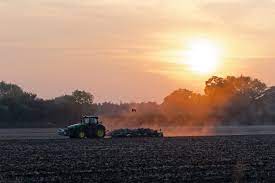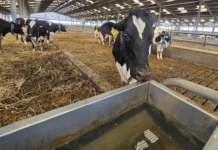- New report reveals key areas for on-farm action to restore farming’s landscapes and lessen the impact of climate change
- Evidence from 18 UK farmers (including six from Wales) shows how locally-led actions are needed to bring back balance to ecosystems, rebuild soil health, prevent floods, protect water quality, restore habitats, enhance carbon management and strengthen rural communities
- Over nine in ten people (98%) want farming to do more to address climate change and biodiversity loss
- The Nature Friendly Farming Network (NFFN) calls for long-term investment in climate-friendly farming and mandatory labelling to quantify how farming impacts the environment
Farming needs to urgently scale and pace the adoption of nature-based solutions for addressing climate change and biodiversity loss or face an uncertain future, warns the Nature Friendly Farming Network. The new Rethink Farming report presents evidence that farming with nature can restore natural assets and improve resilience to a warming world.
Ahead of COP26, the Rethink Farming report presents research with evidence from 18 case studies revealing how farmer-led innovation and nature-based solutions can positively impact farm businesses.
The report highlights practical on-farm action for restoring the natural environment so farming can weather the worst of increasing climate shocks. It argues how continued deterioration will impact the livelihoods of farmers if the sector doesn’t transition to regenerative practices.
The report concludes how farming with nature can maximise returns, offer viability in changing markets, increase profitability through reduced inputs and ensure a more adaptable landscape.
The NFFN is calling for greater ambition from farmers and policymakers to fully utilise the sector’s key role in helping reach Wales’ net-zero target by 2050 and calls for greater action across farm and croft holdings to prevent irreversible outcomes if the trajectory of climate change continues.
Hilary Kehoe, Wales Chair, Nature Friendly Farming Network, says: “As Wales sets forth future farming policies and outlines funding for environmental restoration, we stand on the precipice of transformational change. But it’s in farmers’ best interests to start acting on climate change and nature recovery now, where on-farm action can make businesses more resilient.”
“We know that farming is contributing to ecological disruption. And the science is clear – we have 10 years to avoid the worst effects of the climate emergency. Simple solutions can have the greatest impacts in preparing farming for what’s to come.”
“Owning or managing land is a privilege, and as such, we have a moral obligation to help address the challenges we face. It’s not just farmers, it’s everyone.”
The report also includes research of 726 of the NFFN’s public and farmer members, revealing overwhelming concern about how climate change and biodiversity loss will affect UK farmers. Public support calls for the sector to do more to address these twin challenges.
- Over nine in ten farmers (92%) are concerned about the effects of climate change on their business, with eight in 10 concerned about biodiversity loss
- Nearly all (97%) of farmers think consumers need to be better educated about the value of natural assets on farms, including how successful management of natural capital is a public benefit
- Over nine in ten think food labels should clearly identify production measures
- Nearly three quarters (71%) do not think the industry is currently equipped to deal with the challenges of climate and nature loss, at the same time as sustainably producing food
- Over nine in ten people (98%) want farming to do more to address climate change and biodiversity loss
- Two thirds (75%) of farmers are concerned that net-zero targets could drive woodland creation that threatens natural habitats and contributes to biodiversity loss if not implemented by a “right tree right place” place approach
The research also reveals over eight in ten people (86%) want to support farmers who are creating wildlife habitats and restoring soil health. Six in ten want to support carbon storage (61%), improved water quality (64%) and high-welfare farming (66%). Over nine in ten (96%) want to see public money support farmers who are implementing restorative measures covering soil health, biodiversity, carbon-storing and water quality. Nearly all (96%) want environmental standards that mitigate climate and restore nature to be enshrined in law.
The report calls for mandatory labelling for both domestically produced and imported food, with a robust and transparent labelling regime that promotes traceability and encourages the adoption of climate-friendly farming through consumer-led incentive.
The report is endorsed by leading environmental organisations including the Soil Association, Plantlife, Woodland Trust, RSPB, Butterfly Conservation, Woodland Trust and more. Sustain, Farm Wildlife and the James Hutton Institute have also contributed to the report with supporting statements.

| [donate]
| Help keep news FREE for our readersSupporting your local community newspaper/online news outlet is crucial now more than ever. If you believe in independent journalism,then consider making a valuable contribution by making a one-time or monthly donation. We operate in rural areas where providing unbiased news can be challenging. |


















